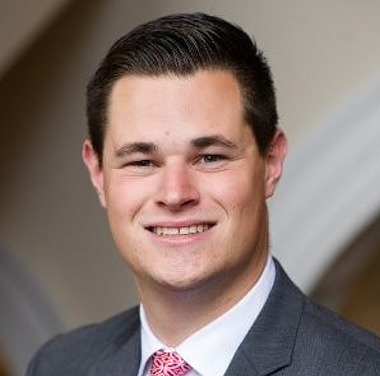#StartupsEverywhere Profile: Michael Zavagno & Griffin Kurzius, Co-Founders, TopProp
This profile is part of #StartupsEverywhere, an ongoing series highlighting startup leaders in ecosystems across the country. This interview has been edited for length, content, and clarity.
Connecting Sports Fans to Play in Head-to-head Matchups
TopProp is a daily fantasy sports platform designed to enable users to import existing fantasy football teams and matchup head-to-head against their friends. We spoke with Michael Zavagno and Griffin Kurzius, Co-Founders of TopProp, about what led them to build the platform and the challenges startups face when navigating different regulatory structures based on location.
Tell us about your background. What led you to TopProp?
Griffin: We met at Wake Forest University. While there, we started playing in a fantasy football league with our Freshman Hall—something we have continued to do ever since. Two years ago we were in a situation where we matched up for a chance to make the playoffs of our league. Mike was down eight points and we wanted to figure out what the likelihood was that he would win and the likelihood that I would win. This was really of interest to us because we had money on the line with our league entry fees.
We looked around at what the marketplace offered in this space and we found nothing that truly could have enabled that experience for your own fantasy league. There are ways in the daily fantasy sports (DFS) landscape to understand the statistical advantages of a specific player but there was nothing that truly replicated the experience of showing the actual chance of Mike winning this matchup and the social experience of smack-talking with one another. That was the driving force: to build a fantasy platform that provided an opportunity for you to take your league more seriously alongside features to help you understand the likelihoods of certain matchups and to provide some of those social channels to make the experience more fun. Two years later that led us to TopProp. After several iterations to meet the industry guidelines, we launched this year for Week One of the NFL.
How does the TopProp platform work?
Griffin: When you sign up, you either join an existing league or add your own league and play head-to-head with your friends. We have a Google Chrome extension that enables users to import their existing season-long fantasy league from ESPN or Yahoo! Sports. You can then invite other members of your league to the platform, and the leagues remain private to only the people you invite. Users are able to create contests with leaguemates on TopProp based on their existing fantasy rosters. We sync the league with the original host site they were built on automatically every six hours to ensure all roster moves stay up-to-date. Users can create a contest with other league members—regardless of whether your team is involved or you are playing that person in your fantasy matchup that week—and they can chat directly with their leaguemates in order to provide that social interaction, which is the reason that a lot of people play fantasy sports. We think that it’s a pretty effective way of enabling users to join the platform and get their friends involved. It's the network effect.
I know you all have a chat functionality where users can communicate with the members of their league. Have you thought about what this user-generated content means from a legal and policy perspective?
Griffin: We do have certain guardrails in place in our chat features. If someone says something uncalled for, harmful, or that infringes on a copyright, users have the ability in the platform to flag such posts so that we are notified and can get that removed. Our platform is meant to be a fun social platform to engage but there's certainly a difference between what is fun and what crosses the line.
You operate in a space that is highly regulated at the state level. What data do you have to collect and how do the geolocation factors impact your work?
Michael: Given that every state sort of has varying laws—such as age requirements or deposit requirements—on who can access a platform like TopProp, we have to capture that user's geolocation data every single time they sign in. I live in California now, but if I were to travel to Arizona for the day, we would have to be able to cut off access once that change in location happens in order to comply with state regulations and where we could legally operate. This means, in addition to capturing your initial signup state because the platform is assuming that's most likely your home base, we have to ping their location and store that data every single time a user wants to access the platform.
On the larger scale data front, beyond information like geolocation, we have a built-in payment provider that collects most of the user information, and conducts the Know Your Customer (KYC) compliance checks for us, which is another legal requirement. So we're not storing any of the personal information on our own site, that's going all through the digital wallets. That relationship is very beneficial to us because we don't have to actually store the data ourselves or be subject to any of the much stricter privacy restrictions that come with having access to such data.
All that said, with all the different legal frameworks out there around both the data we collect and how we can operate, it can get quite confusing. We've certainly seen other platforms operating in states where our lawyers have told us we shouldn't be operating, so we often find ourselves looking at these platforms and think, “Why are they able to operate in this way? Is that something that they've gotten approval for somehow or are they just willing to take the risk and sort of challenging policymakers to come after them?” We're trying to stick very strictly to following the letter of the law, making sure that our platform in its entirety is in compliance. We've changed our plans and how we operate a number of times to be more compliant. But I think it does sort of put us at a disadvantage relative to people who are willing to take more compliance risks or have the resources to better understand all the nuances in the different frameworks that are out there.
Are there any local, state, or federal startup issues that you think should receive more attention from policymakers?
Griffin: This is very micro specific to the DFS industry, but the fact that every state is so different from one another on a regulatory standpoint makes it challenging to make sure we're compliant in every state and get all the proper licensing applications submitted. For example, I live in Massachusetts, and in Massachusetts the minimum age to play DFS is 21. Then there's Nebraska where the minimum age is 19. These widely varied policies require a whole other level of coding to interact with the geolocation data that we have to pull. This makes it, from the perspective of getting our platform off the ground and out there in front of the most users possible, that much more challenging. Additionally, the resources that we have to put into some of these licensing applications can be on the verge of cost prohibitive, one state’s application was 60 pages alone. As a small startup, it makes it that much more challenging, especially when you're trying to devote resources to getting market share from much larger players that have hundreds of employees.
What are your goals for TopProp moving forward?
Michael: First and foremost, we've really been heavily focused on user growth. We’re obviously in a bit of a saturated space. But we think that our solutions are certainly unique, especially given our platform’s ability to facilitate social engagement with friends, compared to a lot of platforms who change it from another DFS platform by five or 10 percent and call it their own product. We're trying to drive eyeballs to the page and introduce people to the content. Then we’ll be working to supplement that user growth with different products and different enhancements that we'll be rolling out. We're going to move from football into other sports and expand our offerings to meet the market, but user growth is currently our top priority.
All of the information in this profile was accurate at the date and time of publication.
Engine works to ensure that policymakers look for insight from the startup ecosystem when they are considering programs and legislation that affect entrepreneurs. Together, our voice is louder and more effective. Many of our lawmakers do not have first-hand experience with the country's thriving startup ecosystem, so it’s our job to amplify that perspective. To nominate a person, company, or organization to be featured in our #StartupsEverywhere series, email ian@engine.is.




